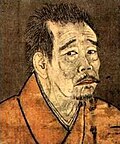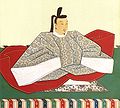Ikkyū (一休宗純, Ikkyū Sōjun, February 1, 1394 - December 12, 1481) was an eccentric, iconoclastic Japanese Zen Buddhist monk and poet. He had a great impact...
14 KB (1,622 words) - 01:06, 27 April 2024
released in 2014. Ikkyū-san (一休宗純, Ikkyū Sōjun) was born in 1394 in Kyoto. He was the son of Emperor Go-Komatsu and Mrs. Iyo. Ikkyu and his mother had...
7 KB (491 words) - 12:56, 22 February 2024
1412) Naishi: Unknown (daughter of a retainer from the Southern Court) Ikkyū Sōjun He was named after Emperor Kōkō, who had the alternate name Komatsu,...
11 KB (1,116 words) - 12:16, 30 April 2024
revealed to be the child of two I-jin, Nancy Makuhari and the deceased Ikkyū Sōjun, and the tool in Joker's scheme. As the son of two great, though distinct...
32 KB (4,276 words) - 00:42, 31 October 2023
that of earlier times. Of note is the role of Ikkyū Sōjun, a successor of Shūhō Myōcho at Daitoku-ji; Ikkyū was instrumental in elevating the appreciation...
27 KB (3,490 words) - 12:24, 11 April 2024
and 15th centuries. Notable writers of the genre include Musō Soseki, Ikkyū Sōjun, Zekkai Chūsin (絶海中津), Sesson Yūbai, Gidō Shūshin, Jakushitsu Genkō,...
7 KB (873 words) - 08:18, 12 November 2023
encounter with a Buddhist monk, Ikkyu Sojun, who was known for his taste for sake and prostitutes. According to the story, Ikkyū met the Hell Courtesan during...
6 KB (554 words) - 14:01, 26 February 2024
Emperor Go-Tsuchimikado designated Ikkyū Sōjun as the head priest. With the help of merchants of the city of Sakai, Ikkyū contributed significantly to the...
10 KB (925 words) - 04:15, 4 January 2022
priest Ikkyū Sōjun. It was Ikkyū's teaching that "the Buddha dharma is also in the Way of Tea" which inspired Jukō's creation of the tea ceremony. Ikkyū presented...
7 KB (795 words) - 02:21, 26 May 2023
sycophancy, and while there continued to be exceptional individuals like Ikkyū Sōjun, this period showed a general tendency toward stagnation and degradation...
75 KB (8,733 words) - 00:09, 28 March 2024






